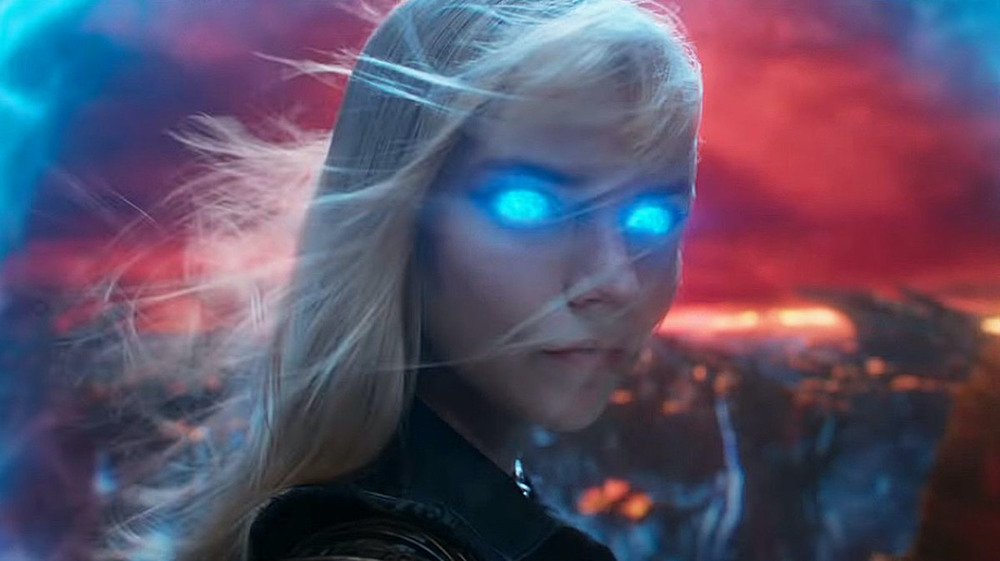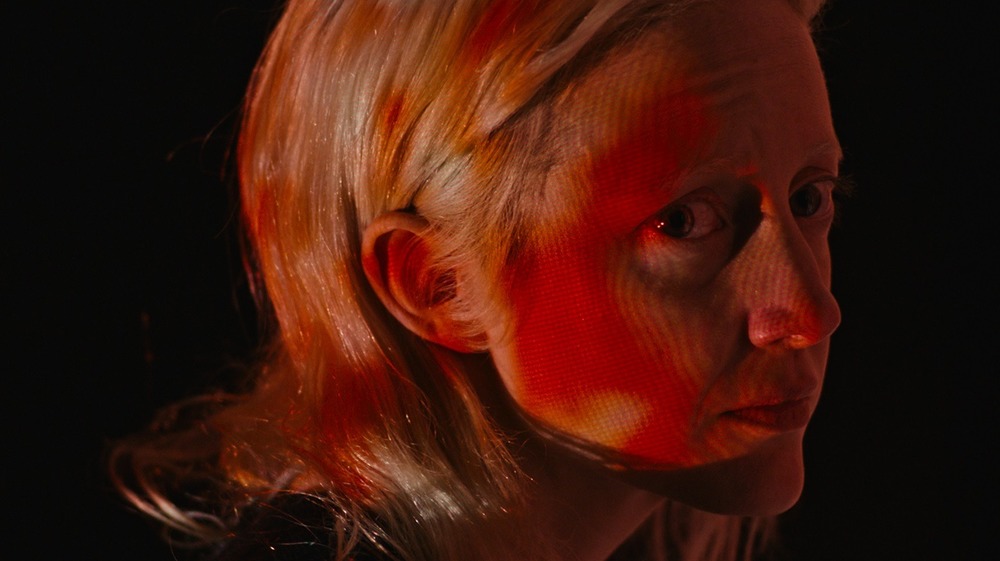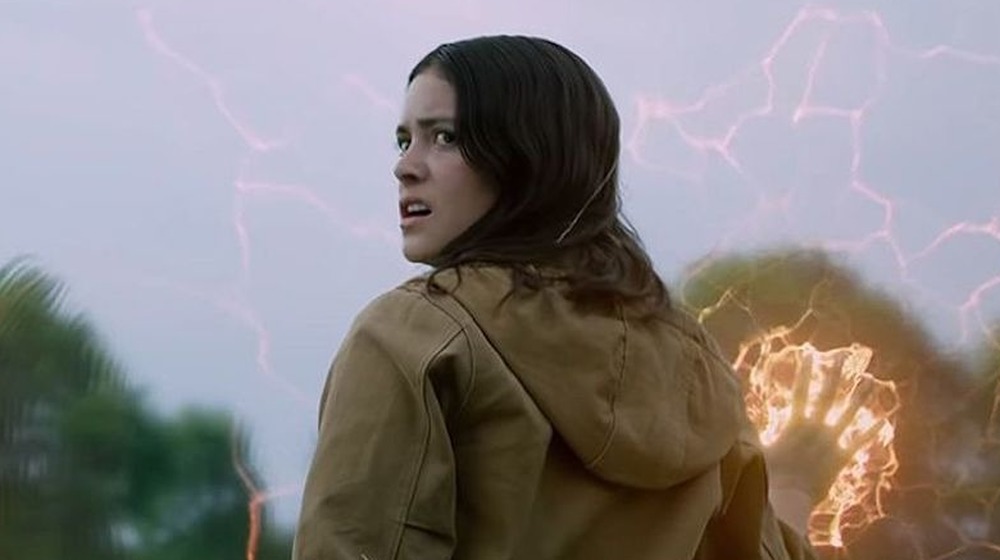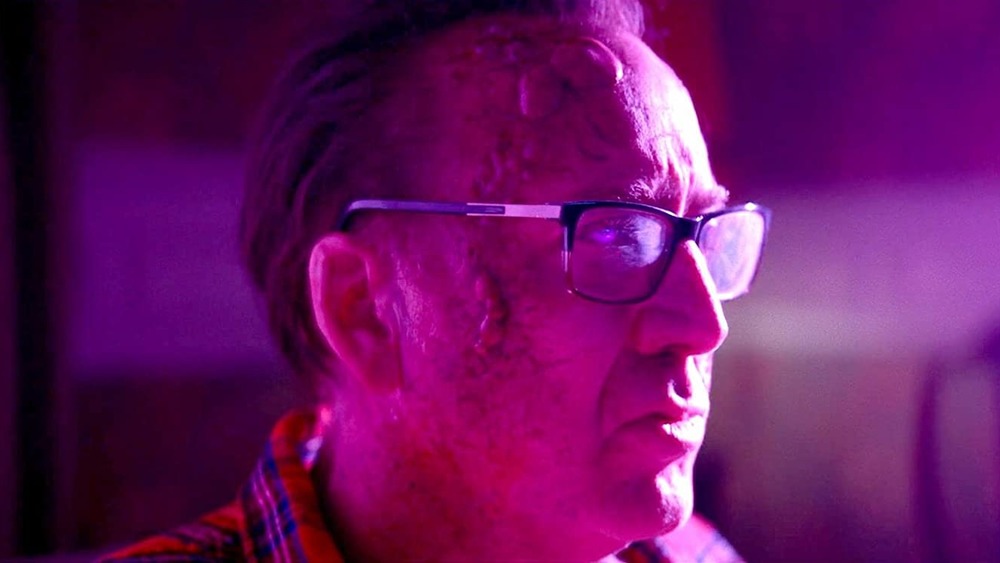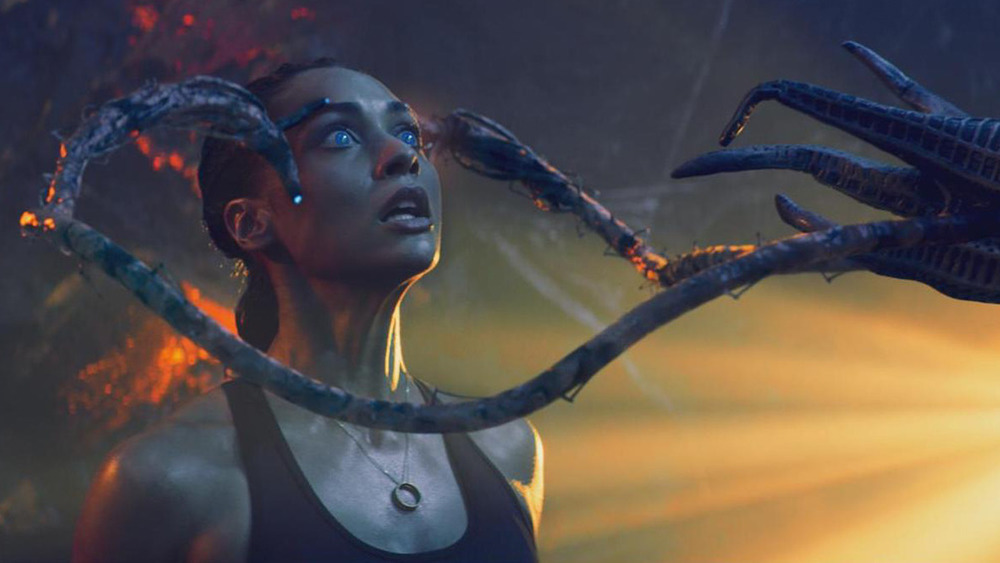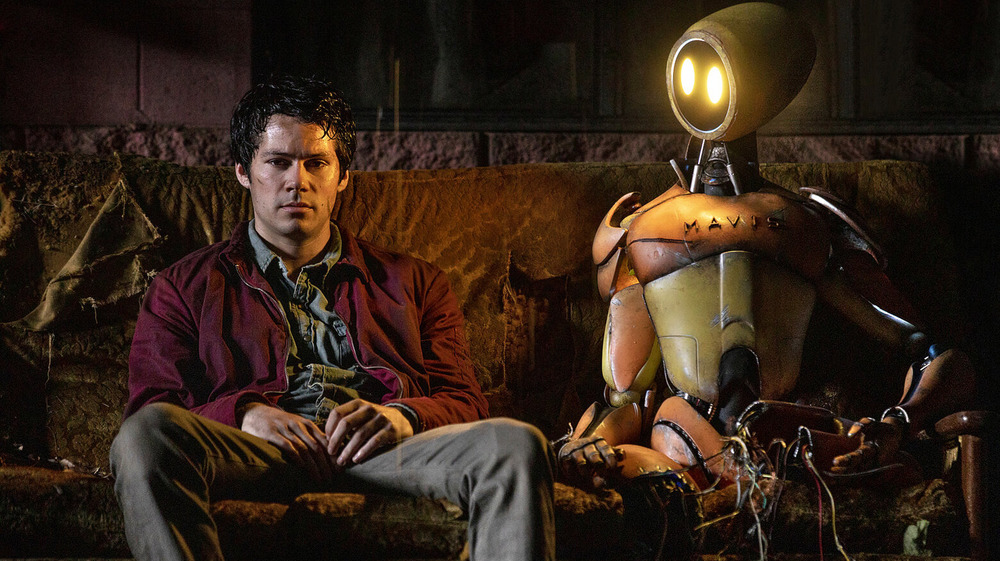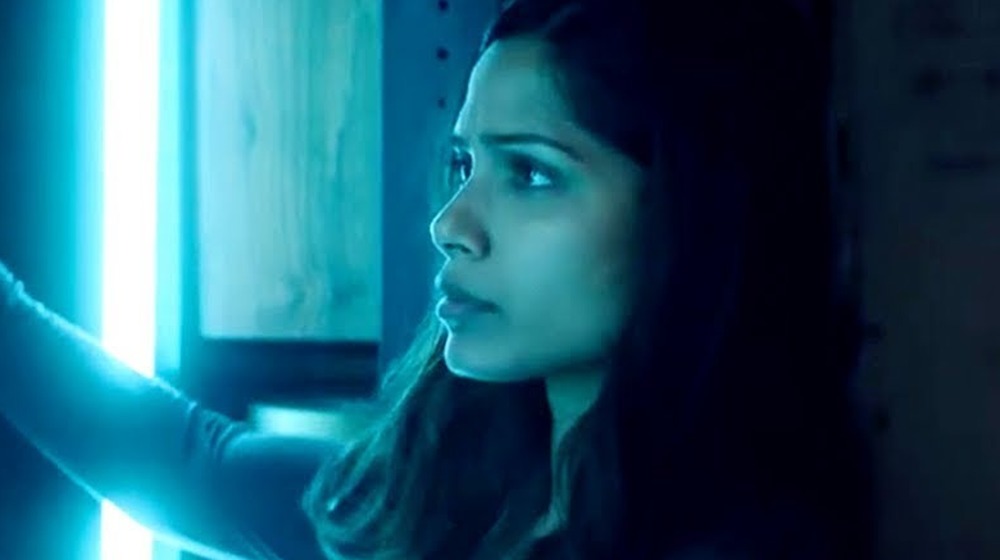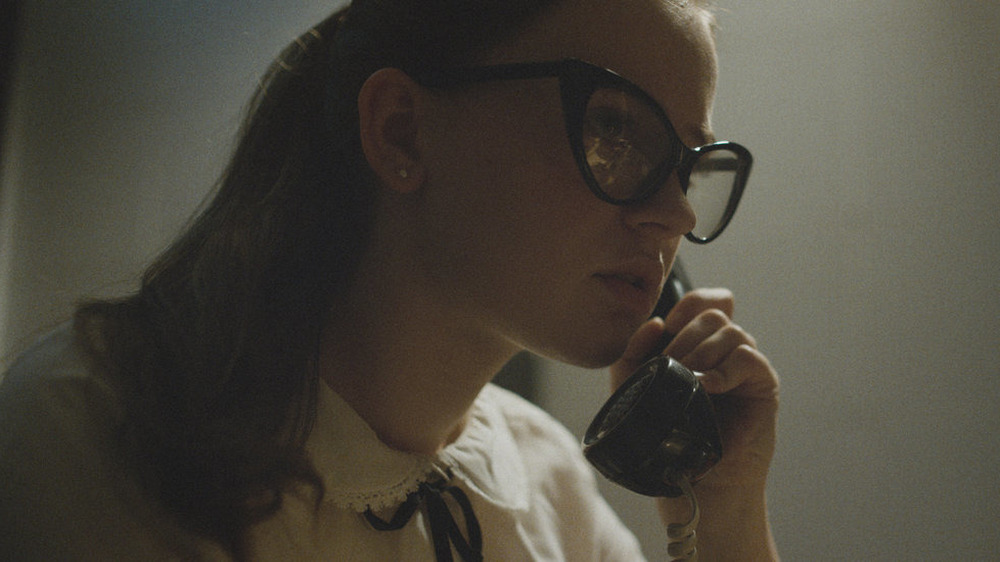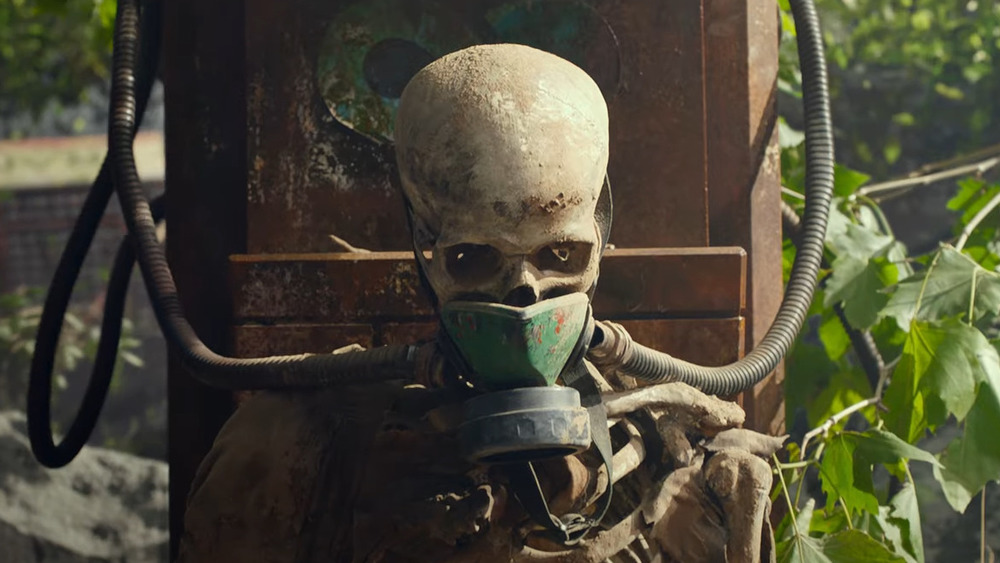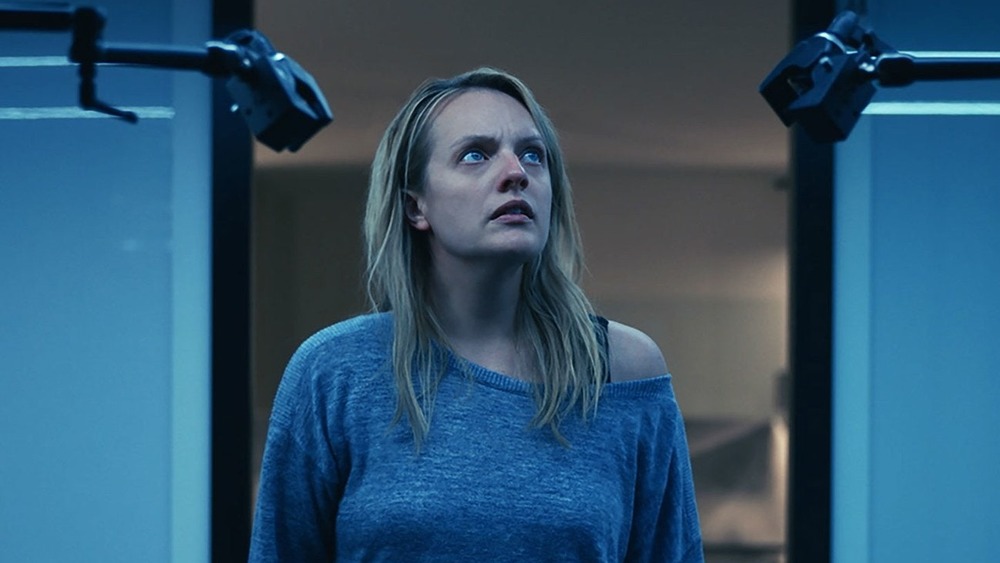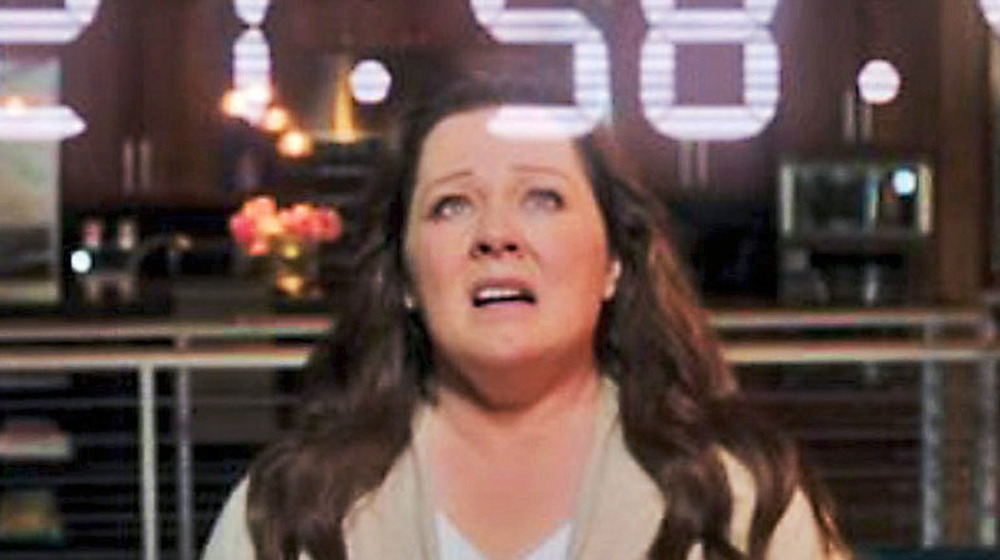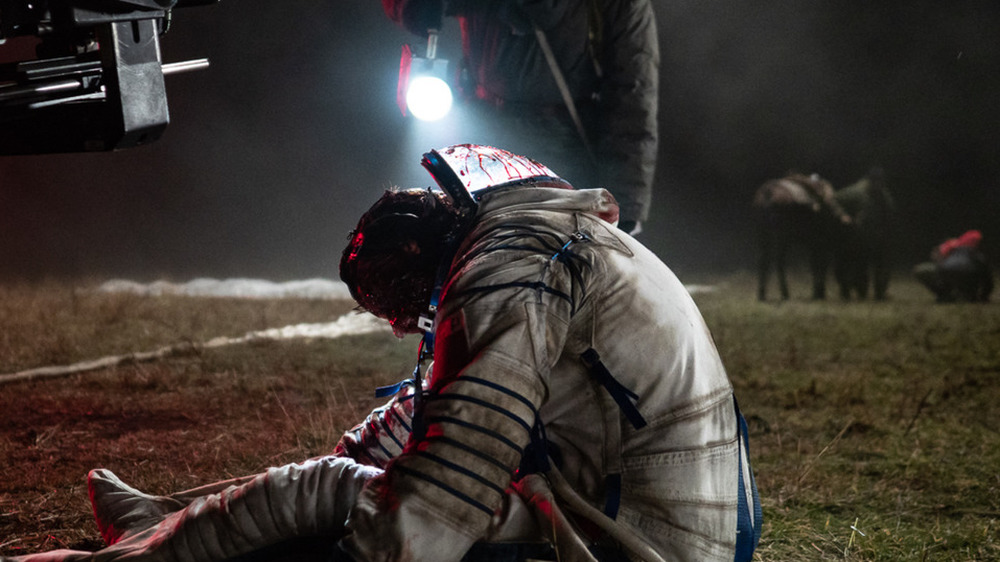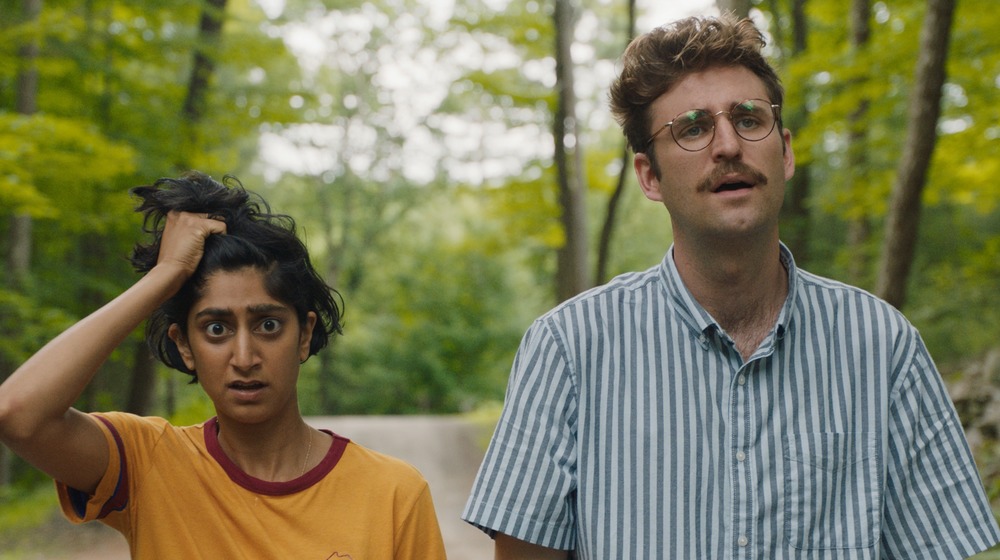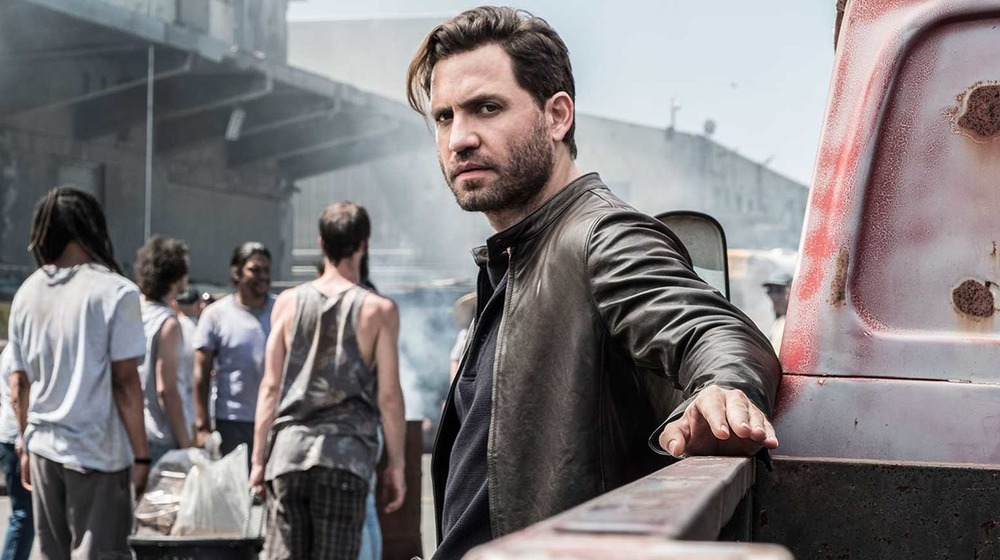The 7 Best And 7 Worst Sci-Fi Movies Of 2020
2020 will be remembered as an anomalous year for sci-fi movies because of the almost complete lack of blockbusters. A brief glance at the top-grossing movies of the last few decades shows sci-fi dominating the charts — usually in sturdy franchises such as Star Wars, Jurassic Park, or The Avengers, sometimes in one-off hits like Avatar (for now) or Interstellar. But Covid-19 shut down most movie theaters in the early spring, and with a few exceptions, such as Christopher Nolan's Tenet, studios pulled their biggest offerings indefinitely.
But sci-fi is a flexible genre. Its themes and visuals often work just as well in low-budget and even micro-budget indie films. Among many examples is the well-regarded Ex Machina from 2015. Despite having a fraction of the budget of Star Wars: The Force Awakens, it still beat the latter out for that year's Academy Award for visual effects, proof that a paucity of resources often inspires filmmakers to get creative in realizing their vision. Of course, the opposite is just as often true. The lack of an original vision coupled with subpar visual effects can make low-budget sci-fi seem goofy and derivative. With few blockbuster releases, our list is composed almost exclusively of inexpensive sci-fi flicks of both varieties — tired and inspired. Here, according to Rotten Tomatoes, are the seven best and the seven worst of 2020.
Best -- Possessor
A strange brew and an unlikely candidate for the best-reviewed sci-fi movie of any given year, Possessor (93% critics score on Rotten Tomatoes) is about an assassination bureau that targets its victims by implanting the consciousness of its designated killer, Tasya Vos (Andrea Riseborough), into someone the victim knows, creating a real life deepfake that can approach the victim without them knowing. Things go wrong when the latest implant victim (Christopher Abbot) resists Vos' invading consciousness, setting the stage for a struggle between dueling minds inside one body — and suggesting ideas about how we've become adept at melding, obscuring, and effacing identities in our virtual age.
The movie mashes up body horror, extreme gore, sci-fi rigamarole, and psychedelic imagery that would be at home in a 1960s movie. Director Brandon Cronenberg has found support among critics for his brand of sci-fi that's at once cerebral and visceral, a formula that his father, David Cronenberg (Videodrome, The Fly, eXistenZ), all but patented. With its extreme violence, Possessor is not an easy watch (and it only rings in at 59% on the Rotten Tomatoes audience score), but its exploration of how violence annihilates the soul is worth the queasy trip for some. As David Sims wrote in The Atlantic, "Like all good dystopian fiction, Possessor offers disturbing and timely observations about the world we already live in."
Worst -- The New Mutants
This movie set in the X-Men universe had a troubled production and distribution history. It was reshot, recut, and bounced around in the transition when Disney bought 20th Century Fox (Disney execs were reportedly unhappy with director Josh Boone's handling of the material). Not surprisingly, when the film finally got a theatrical release date in August 2020, critics found the film underwhelming. The New Mutants, about five young mutants locked in a force field-insulated asylum until they can learn to control their dangerous powers, came in at just 35% on the Tomatometer.
Some critics found the premise "a solid, intriguing one," but others were less enthralled by the movie's execution, its silly special effects and laughable character accents. Fans liked the overall results a little better, but not much, while the The Austin Chronicle summed up the prevailing critical view, calling The New Mutants "an idiotic, nonsensical, and weirdly cheap attempt to take the stories in a new direction."
Best -- Color Out of Space
Is Nic Cage crazy? Who knows? Are his movies crazy? Of course, that's why we love them! A companion piece to 2019's phantasmagoric acid trip, Mandy, Color Out of Space again finds Cage doing his patented feverishly possessed schtick amidst a riot of psychedelic visuals. Whereas Mandy found him in revenge mode, Color Out of Space finds him in patriarchal protection mode as Nathan, a husband and father trying to defend his family from the extraterrestrial entity that has crashed into his farm via a meteorite. The entity bathes everything in a neon fuschia light — hence the "color” out of space — and wreaks havoc on people and animals, including Nathan, who slowly goes insane.
Based on a short story by the cult horror writer H.P. Lovecraft, whose work has been the basis for a number of low-budget sci-fi horror flicks, Color Out of Space found favor with critics who praised its energy and visual inventiveness. The Metro (UK) called the movie "a fun, messy, hallucinogenic head trip of a movie, shot with cosmic gorgeousness by cult director Richard Stanley." Stanley hadn't helmed a feature film in 25 years, since he was fired as director of the famous Marlon Brando/Val Kilmer flop The Island of Dr. Moreau, and Color Out of Space feels like a quarter century of ideas stuffed into one big extravaganza. If it seems uneven at times, it's certainly not for lack of passion.
Worst -- Skylines
If you stumbled into the TV room, half asleep, without your glasses, to find your roommate watching Skylines at 3AM, you might — for a fleeting moment — think that it's Aliens, or Starship Troopers, or District 9, or Predator, or Edge of Tomorrow, or...you get the idea. Taking a step closer, you realize it's just a derivative melange of those much better films. You wisely decide to skip it, but not before telling your roommate to stop using the pandemic as an excuse to not look for a job.
A sequel to the critically and commercially successful low-budget Beyond Skyline from 2017, this similarly inexpensive sci-fi actioner chronicles the efforts of Rose (Lindsey Morgan), an alien-human hybrid, to travel to an alien planet and retrieve a something-or-other that will save Earth. Not content to funnel its limited funds into a handful of impressive effects, Skylines instead parades an endless procession of bad ones. You have to admire a film that knows exactly what it is and doesn't try to hide it. Morgan, bringing sci-fi cred from The 100, carries the film as well as she can, but ultimately Skylines doesn't try for even one moment to be fresh or inventive. At 52% on the Tomatometer, critics didn't revile Skylines, but nor did they particularly like it, with Nick Allen of Rogerebert.com writing, "For all the effort into making bombastic sci-fi action without a studio tentpole's budget, it just assumes that people won't miss originality."
Best -- Love and Monsters
Love and Monsters is the anti-Skylines — a movie that proves that any material can be made interesting with sufficient wit, heart, and a novel approach. The alien invasion and post-apocalyptic tropes on display don't differ much from most movies in the genre, including some on this list. But Love and Monsters twists the sci-fi genre beats around just enough YA elements to feel fresh. The movie stars Dylan O'Brien as Joel, who lives underground with a band of survivors, hiding from Earth's creatures that have mutated into giant monsters in the wake of an asteroid impact. After seven years, Joel is still pining for his high school girlfriend and he decides to set off on a quest to reunite with her against the wishes of his adopted family, who don't think Joel possesses the survival skills necessary to make it very far.
With a $30 million budget, the movie has more resources at its disposal than most of the sci-fi films of 2020, though it's still a drop in the bucket compared to the typical sci-fi blockbuster price tag that runs into the hundreds of millions. But even with a bigger budget, the filmmakers wisely understand that the heart of the film isn't in the action or special effects, but in the endearing character of Joel and his lovesick quest (and an adorable sidekick pooch). At 92% on the Tomatometer, Love and Monsters was one of the best reviewed sci-fi movies of 2020.
Worst -- Only
Only chronicles yet another post apocalyptic scenario, this one featuring a space-borne virus that wipes out most of Earth's women, leaving Eva (Freida Pinto), one of the few survivors, to try to hold out against both the plague and the men who hunt surviving women in hopes of selling their ovaries to government labs. When Eva eventually catches the virus, she and her boyfriend (Leslie Odom, Jr.) take one last life-embracing road trip that provides the movie with its few moments of action and revelation.
Some sci-fi movies are crimes against art and culture (Battlefield Earth), while some are undeniable masterworks (2001: A Space Odyssey). Most, however, fall into the vast continuum in between, neither memorable nor offensive. Only fits squarely in this third category. Critics didn't consider it a terrible movie, per se — its 40% Tomatometer doesn't exactly put it into embarrassing flop territory. But neither did they find it a particularly compelling or original expression within the sci-fi genre, and they found the feminist themes muddled. Most reviews echoed that of The Hollywood Reporter: "Reminiscent of scores of previous similarly themed sci-fi efforts...Only proves more intent on establishing an ominous mood than providing thrills."
Best -- The Vast of Night
Along with Possessor and Love and Monsters, the UFO movie The Vast of Night was one of only three 2020 sci-fi films to achieve a better than 90% score on the Tomatometer. Set in a small town in 1950s New Mexico (because of course), the movie is a fresh take on an alien contact story, with two young people, Everett and Fay (Jake McCormick and Sierra Horowitz), trying to piece together the mystery of what might be visiting their town, when it may have happened before, and who covered it up. With characters communicating largely via telephone and radio, the tiny town, already cut off from the larger world, seems even more remote.
A true indie endeavor, The Vast of Night was made for only $700,000, and first-time writer/director Andrew Pattison uses every penny judiciously, creating a sense of eerie nighttime isolation and sinister goings-on. Despite the small budget, Pattison's camera is unmoored, zipping over the rural burg with a sense of headlong freedom, then creeping through a crowded high school gym in an accomplished long take/tracking shot. While critics found the narrative elements somewhat familiar, they praised the talented filmmaking, spooky atmosphere, and fresh aesthetic. "The story of The Vast of Night is nothing particularly special," wrote Tasha Robinson in Polygon. "The storytelling, though, is spectacular."
Worst -- 2067
Our best and worst sci-fi movie list has thus far included most of the standard sci-fi narrative categories: dystopias, post-apocalyptic scenarios, malevolent AI, and alien invasions. But no list of any given year would be complete without at least one entry in the time travel subgenre, here represented by the Australian film 2067. Of course, a good time travel story is hard to do well. The filmmakers must create convincing time travel technology, as well as work out all the contradictions and paradoxes that time travel potentially presents, while also, you know, telling a compelling story. 2067, unfortunately, succeeds at none of these things, at least according to critics.
Opening in — you guessed it — 2067, the movie stars Kodi Smit-McPhee, a thespian well-traveled in science fiction cinema (The Road, Dawn of the Planet of the Apes, X-Men: Apocalypse), who must travel 400 years into the future in a time machine invented by his father to prevent mankind's extinction by climate change. The movie achieved only 31% on the Tomatometer, with critics mostly panning the poorly executed story and subpar filmmaking. John DeFore of the Hollywood Reporter summed up the general consensus, calling the film a "sci-fi misfire," and writing, "Has a couple of interesting ideas up its sleeve but doesn't know how to reveal them."
Best -- The Invisible Man
Although some would argue that The Invisible Man belongs more to the horror or thriller genres, its sci-fi elements and heritage are just as key to its makeup. Leigh Whannell's movie is one of many versions of master sci-fi writer H.G. Wells' original novel, as well as a reboot of the famous Universal monster movies of the 1930s and 40s. Those films, including the many sequels and spin-offs of Frankenstein and The Invisible Man, depend as much for their themes and effects on science fiction as they do horror — specifically the trope of the mad scientist at work in the lab, developing cutting edge bio-technologies.
While The Invisible Man of the original novel and film is a chemist who invents an invisibility serum, the 2020 version is a world-renowned optical engineer who creates an invisibility suit that effectively camouflages the suit's wearer. His lab is full of futuristic tech, and the house he shares with his stalking victim (Elisabeth Moss) is a creepy extension of the lab, immaculate to the point of sterility and full of harsh edges and unsettling secrets. The suit gets most of its workout in the movie's second half, particularly in a thrilling escape sequence set in a mental hospital that pays homage to a similar sequence in the sci-fi classic Terminator 2: Judgement Day. The Invisible Man was a success with both audiences and critics (91% on the Tomatometer), who praised both its entertainment value and its #MeToo timeliness.
Worst -- Superintelligence
The only sci-fi comedy on this list, Superintelligence stars Melissa McCarthy as Carol Peters, the "world's most average person," who is contacted by an AI (with the voice of James Corden) that wants to study her in the hopes of achieving greater insight into the nature of humanity. The AI has achieved the singularity, the theorized future moment when computers become sentient and more capable/intelligent than their human designers (dramatized in far better movies such as Her and The Terminator). Of course the entity starts off friendly, before revealing that it is using Carol as a test to discover whether humanity is worth continuing to survive. If she fails, well, bye bye civilization.
The premise is sufficient for a decent comedy, and the trailer has its share of passable jokes. Unfortunately critics didn't find that the actual movie reflected any of that. The movie scored a woeful 32% on the Tomatometer – and an even lower audience score — with reviewers appreciating neither the attempts at humor nor the sci-fi elements. Christy Lemire wrote, "Everything about Superintelligence seems aimed at being as insipid and forgettable as possible," while David Ehrlich opined, "The only way to outsmart the system is to watch something else instead."
Best -- Sputnik
Sputnik opens in the early 1980s with two cosmonauts crash landing on Earth after an encounter with an alien presence in orbit. One of the cosmonauts, Konstantin, survives due to a symbiotic relationship he has developed with the alien, which now lives in his esophagus. Soviet military scientists bring in Dr. Tatyana Klimova (the excellent Oksana Akinshina), a young psychiatrist known for controversial methods, to help separate the man from the alien. Of course, all is not as it seems, and as the horrific revelations pile up at the secret military institution, Tatyana tries to help Konstantin escape, even at great risk to herself.
Sputnik plays like a Russian version of a movie set in the Alien universe, with a determined female protagonist going up against monsters of both the extraterrestrial and human variety — a not-so-subtle critique of Soviet-era human rights abuses. Critics appreciated the dark atmosphere of the movie and the eerie creature effects, even if some were disappointed in the movie's lack of originality: "I am really tired of these slithery things that just screech a lot. We really need new creature animation," said Film Week's Amy Nicholson. Overall, though, both audiences and reviewers found Sputnik one of the more solid sci-fi cinematic efforts of 2020, with Tara Brady of the Irish Times writing, "It's easy to see why Sputnik has dominated the streaming services in its native Russia."
Worst -- Proximity
Proximity tells an alien abduction story that recycles a number of sci-fi tropes from well-known sources, such as the films of Steven Spielberg (especially Close Encounters of the Third Kind), and The X-Files. Central to the story is a secret government agency that's devoted to investigating and covering up extraterrestrial phenomena, as well as a young scientist from NASA's Jet Propulsion Laboratory who intends to find out the truth about his own abduction by otherworldly visitors.
Proximity was written and directed by first timer Eric Demeusy, whose background in visual effects gives the movie the polished look of a much pricier production. But the story is where the film falters, according to critics, who praised Demeusy as a promising talent, but found the movie little more than a collection of spare genre parts without an original vision tying them together. As Sarah Michelle Fetters wrote in Movie Freak, "It's a lot, and Demeusy doesn't juggle it all with a whole lot of precision. It all feels like some esoteric hodgepodge of ideas culled from a variety of different cinematic sources."
Best -- Save Yourselves!
This extremely low-budget sci-fi comedy posits another alien invasion/end of civilization scenario, but one that channels contemporary millennial concerns in a lighthearted manner. A young Brooklyn couple (Sunita Mani and John Paul Reynolds), hopelessly addicted to their phones, decide to unplug for a spiritual improvement weekend in the country. Their timing is impeccable, as an alien invasion rains down on Earth just after they leave. Isolated, and without their phones, the couple only gradually realizes what has befallen humanity. The movie wrings laughs out of the fact that living their lives primarily online has left them with little real-world knowledge and even fewer skills that might help them survive.
Save Yourselves! landed at 88% on the Tomatometer, with critics praising the chemistry between the main characters and the offbeat comedy. "For the most part it manages an adept balance between satire, sincerity and sheer silliness that's ultimately winning," wrote Leslie Felperin in The Guardian. With a tiny budget, the filmmakers don't even try with the special effects (the aliens are fluffballs reminiscent of the Tribbles from Star Trek), and the conclusion leaves some viewers scratching their heads. But, overall, Save Yourselves! works as a diverting, if slight, sci-fi story.
Worst -- The Last Days of American Crime
Not just the worst reviewed sci-fi movie of 2020, but one of the worst reviewed movies on Rotten Tomatoes ever, with a 0% critics rating and 23% audience score. The movie is set in a near-future fascist dystopia in which crime has overrun American cities (these scenarios always seem to conveniently forget that violent crime rates have been dropping for decades). The government's solution to the uncontrollable crime wave is mind control in the form of the American Peace Initiative, described as "a signal that acts as a synaptic blocker, making it impossible for anyone to perform an act they know to be unlawful." The movie opens when the API is set to go live in a week. That gives the brutal criminal Graham Bricke (Edgar Ramirez) and his crew a week to pull off, you got it, one last heist.
There are a lot of things wrong with The Last Days of American Crime, not the least of which is that it wastes that decent premise. It's ugly to look at and narratively incoherent. It gushes clichés and revels in sadism. It features a lazy voiceover narration that even beginning screenwriting students would know to avoid. Critics found it to be not only bad cinema, but morally execrable as well. The New York Post called it "idiotic Netflix torture porn," writing, "Don't care about story, characters or words, but love violence? Even you will be disappointed."
